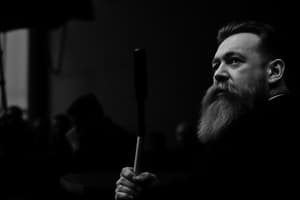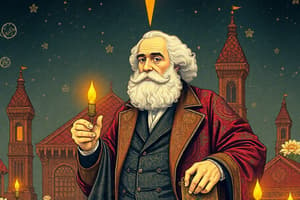Podcast
Questions and Answers
Which philosopher described an ideal state in which a ruling class of guardians serves the needs of the whole community?
Which philosopher described an ideal state in which a ruling class of guardians serves the needs of the whole community?
- Plato (correct)
- Adam Smith
- Karl Marx
- Thomas More
Which religious group practiced a simple kind of communism as a way of maintaining solidarity and avoiding the evils of private ownership?
Which religious group practiced a simple kind of communism as a way of maintaining solidarity and avoiding the evils of private ownership?
- Hindus
- Buddhists
- Muslims
- Christians (correct)
Who wrote the visionary work Utopia, which describes an imaginary perfect society where money is abolished and people share goods?
Who wrote the visionary work Utopia, which describes an imaginary perfect society where money is abolished and people share goods?
- Karl Marx
- Adam Smith
- Plato
- Thomas More (correct)
What is the main goal of communism?
What is the main goal of communism?
Which economic system does communism oppose?
Which economic system does communism oppose?
When did the term communism start to be widely used?
When did the term communism start to be widely used?
Who wrote The Communist Manifesto?
Who wrote The Communist Manifesto?
What did Karl Marx and Friedrich Engels conclude in The Communist Manifesto?
What did Karl Marx and Friedrich Engels conclude in The Communist Manifesto?
Which of the following is a characteristic of a purely communist state?
Which of the following is a characteristic of a purely communist state?
What is democratic centralism in the context of communist parties?
What is democratic centralism in the context of communist parties?
What is a centrally planned economy?
What is a centrally planned economy?
Which countries continue to function as communist states today?
Which countries continue to function as communist states today?
Which country is regarded as one of the most isolative and secretive in the world?
Which country is regarded as one of the most isolative and secretive in the world?
What was the result of Mao's 'Great Leap Forward' plan in China?
What was the result of Mao's 'Great Leap Forward' plan in China?
What is the main political party permitted to function in Cuba?
What is the main political party permitted to function in Cuba?
Which country is ranked 175th in the world for economic freedom, according to the Heritage Foundation?
Which country is ranked 175th in the world for economic freedom, according to the Heritage Foundation?
What ideology of communism does North Korea adhere to?
What ideology of communism does North Korea adhere to?
What is the current form of government in North Korea?
What is the current form of government in North Korea?
Which of the following countries listed communism as their official form of government in the late 20th century?
Which of the following countries listed communism as their official form of government in the late 20th century?
According to scholars, why do modern scholars doubt that any of the countries under communism were truly communist?
According to scholars, why do modern scholars doubt that any of the countries under communism were truly communist?
Which book argues that the Cold War was an ideological struggle between the private capitalism of the West and the 'state-controlled capitalism' of the Soviet Union?
Which book argues that the Cold War was an ideological struggle between the private capitalism of the West and the 'state-controlled capitalism' of the Soviet Union?
What was one of the common factors that contributed to the failure of communism?
What was one of the common factors that contributed to the failure of communism?
Why did many Soviet workers focus on black market activity rather than their government-assigned jobs?
Why did many Soviet workers focus on black market activity rather than their government-assigned jobs?
What effect did corruption, laziness, and intense government surveillance have on the communist system?
What effect did corruption, laziness, and intense government surveillance have on the communist system?
Which of the following is a key difference between centrally planned economies and free-market economies?
Which of the following is a key difference between centrally planned economies and free-market economies?
What is the goal of communism?
What is the goal of communism?
How does socialism differ from communism?
How does socialism differ from communism?
Which country is often considered as the prototypical example of communism in action?
Which country is often considered as the prototypical example of communism in action?
What were the reform efforts undertaken by Mikhail Gorbachev in the Soviet Union called?
What were the reform efforts undertaken by Mikhail Gorbachev in the Soviet Union called?
What led to the disintegration of the Soviet Union into 15 separate republics?
What led to the disintegration of the Soviet Union into 15 separate republics?
Flashcards are hidden until you start studying
Study Notes
Philosophers and Theories of Communism
- Plato described an ideal state governed by a ruling class known as guardians, focused on serving community needs.
- Early Christians practiced a form of communism to maintain solidarity, emphasizing shared resources over private ownership.
- Thomas More authored "Utopia," depicting a perfect society with abolished money and communal goods.
Goals and Opposition of Communism
- The main goal of communism is to establish a classless society where resources are shared equitably.
- Communism opposes capitalism, advocating for collective ownership over private property.
Historical Context of Communism
- The term “communism” saw widespread use in the mid-19th century.
- "The Communist Manifesto," written by Karl Marx and Friedrich Engels, outlines the principles of communism and critiques capitalism.
Characteristics and Structures of Communist States
- A purely communist state typically features collective ownership of means of production and elimination of class distinctions.
- Democratic centralism refers to a governance structure in communist parties where policy decisions are made centrally, but members are expected to support the party line.
- A centrally planned economy involves state control over production and distribution, contrasting with market-driven economies.
Current Communist Regimes and Historical Contexts
- Nations functioning as communist states today include China, Cuba, Vietnam, Laos, and North Korea.
- North Korea is noted for being particularly isolated and secretive in its governance.
- Mao’s 'Great Leap Forward' in China resulted in economic disaster and widespread famine.
Political Systems and Governance
- The Communist Party is the only political party allowed to operate in Cuba.
- Cuba ranks 175th in economic freedom according to the Heritage Foundation.
- North Korea adheres to the ideology of Juche, which emphasizes self-reliance, and operates under a totalitarian regime.
Historical Developments and Failures
- Several countries, including those in Eastern Europe, adopted communism as their official government form in the late 20th century.
- Scholars question the true nature of communism in practice, citing deviations from its foundational principles.
- The book "The Cold War: A New History" argues that the Cold War was an ideological conflict between Western capitalism and the state-controlled capitalism of the Soviet Union.
Challenges and Failures of Communist Economies
- Common factors contributing to the failure of communism include corruption, inefficiency, and lack of motivation among workers.
- Soviet workers often turned to black market activities due to disincentives in government-assigned jobs.
- The effects of corruption and government surveillance undermined trust and effectiveness in the communist system.
Economic Differences and Ideological Comparisons
- Centrally planned economies operate through state directives, while free-market economies rely on supply and demand.
- Communism seeks to eliminate class divisions, while socialism allows for some degree of private ownership and market dynamics.
Historical Examples and Reform Movements
- The Soviet Union is often regarded as the prototypical example of communism in action.
- Reform efforts by Mikhail Gorbachev, termed Glasnost and Perestroika, aimed to address economic and political issues but ultimately contributed to the Soviet Union’s disintegration into 15 independent republics.
Studying That Suits You
Use AI to generate personalized quizzes and flashcards to suit your learning preferences.




